LakeHawk180
BANNED

- Joined
- Feb 21, 2022
- Messages
- 731
- Reaction score
- -18
- Country
- Location
Several times a week, Manzoor Ali wakes with a faint hope in his heart and walks from the camp on the outskirts of Dadu, where he and his family have been living since September, to Noorang Chandio, his village an hour away. Each time, he looks to see if the flood water has receded. Each time, he returns disappointed.
This has been Ali’s routine since catastrophic floods hit Pakistan last year. “We lost everything,” says the father of 10. “We can’t go back now as our homes are still flooded and villages are inundated. Officials write down our names but they never come back with any help.
“Some families in other villages who could afford it had the water drained from their homes. They have gone back. We can’t afford it.”
Pakistan experienced its worst-ever flooding last year when three months of heavy downpours submerged about a tenth of the country. The UN called it a climate catastrophe. At least 33 million people were affected, the government said. More than 1,700 people died.
In most areas, the water has receded leaving much damage behind. But in the worst-affected areas – Sindh, where Dadu is located, and Balochistan provinces – stagnant flood water remains across vast swathes of land. At least 1.5m hectares (4m acres) of agricultural land were destroyed, leaving 15 million people short of food and estimated financial losses of between $30bn and $35bn (£25bn and £30bn). International banks and donors have pledged more than $9bn to help rebuild the country.
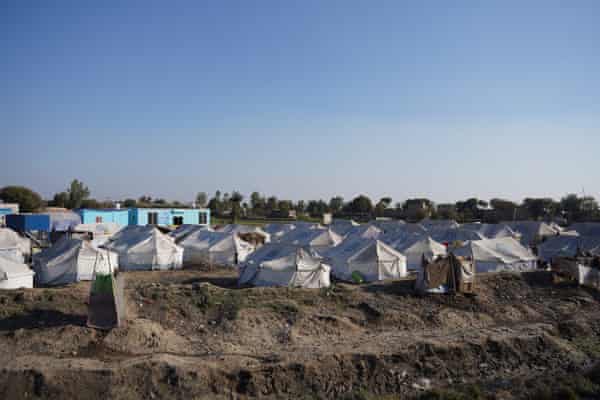 The tent city in Khairpur Nathan Shah, Dadu district, Pakistan, where Manzoor Ali and more than 50 families are still living in camps months after the floods. Photograph: Shah Meer Baloch
The tent city in Khairpur Nathan Shah, Dadu district, Pakistan, where Manzoor Ali and more than 50 families are still living in camps months after the floods. Photograph: Shah Meer Baloch
When Noorang Chandio was flooded in August, Ali joined other families taking refuge on the 50km-long Superio embankment in Dadu. For weeks, about 2,000 people perched there in makeshift shelters on the raised strip of land, which was then only accessible by boat.
When we see rain, we pray to God it should stop. We are tired of this life
Nearby roads have now re-emerged but murky green, pungent water remains, covering acres of the cotton fields. Most surviviors, including Ali’s family, now live in tents in a camp set up by the Sindh authorities.
But life is not easy. “It rained yesterday, and the water was flowing into our camps. We were shivering from the cold all night. When we see rain, we pray to God it should stop. We are tired of this life,” says Badal Chandio, whose tent is next to Ali’s.
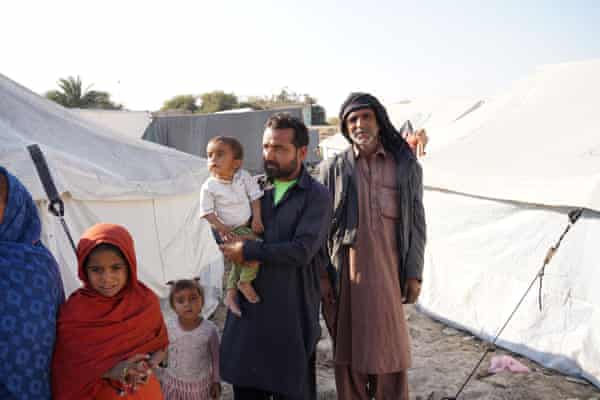 Manzoor Ali, right, with his neighbour at the camp, Badal Chandio, who is holding his son. Photograph: Shah Meer Baloch
Manzoor Ali, right, with his neighbour at the camp, Badal Chandio, who is holding his son. Photograph: Shah Meer Baloch
Both men now sell buffalo dung to make ends meet and say the only financial support they received was a one-off cash payment of 7,000 rupees (£21) from the federal government’s Benazir Income Support Programme.
For the past month, Ali and Chandio say there has been no food distribution from any of the relief workers or NGOs. “We can’t leave our women behind in camps and go for work in other big cities, such as Karachi. We are worried for their safety in the camps,” says Chandio.
Hawwa (she goes by only one name) says it is a humiliating life. “There is no food or help. We have been given no blankets. We’re having a harsh winter, and have been living in camps without any facilities. We are poor. We can’t afford to rent another home, otherwise we could have done it to leave this humiliating life.”
Hawwa received the 7,000 rupees payment but that has not been nearly enough to cover her son’s healthcare costs. Last month, he was admitted to hospital with typhoid. “Medicines need money and no one is helping here. We ask God to come and help us.”
For many, going back to dilapidated homes surrounded by stagnant water has been preferable to living by the side of a road or in the camp. Others have put up tents in the grounds of what were once their homes.
Ghulam Rasool, a labourer in his 70s, returned to his village from the camp in Dadu in December. He found his house still surrounded by flood water. Metal support posts from the roof had been stolen. He used cattle dung and plastic that was floating in the water to patch up the roof.
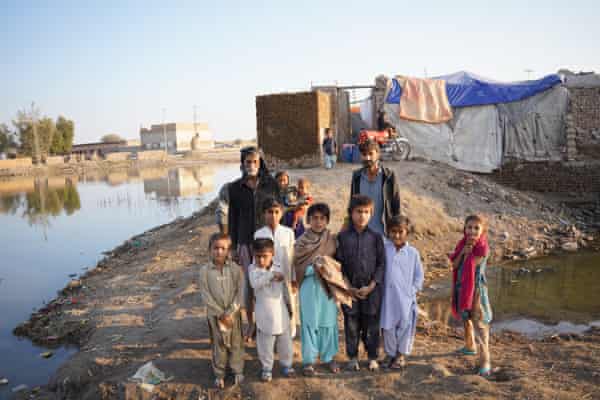 Ghulam Rasool, 72, stands with his son and grandchildren in front of the ruined home they are trying to repair without any state help.Photograph: Shah Meer Baloch
Ghulam Rasool, 72, stands with his son and grandchildren in front of the ruined home they are trying to repair without any state help.Photograph: Shah Meer Baloch
“The floods have affected everyone but the impact is on the poor and labourers more than anyone,” says Rasool. “They don’t have anyone in the government. They don’t have any voice here. Rich and powerful people are getting money and all the help.”
The government has abandoned us … our politicians just remember us during the election
Rasool says he has heard many stories of corruption in the province. In September, hundreds of tents and other rations intended for flood victims were discovered by police in a warehouse in Qambar Shahdadkot district, which borders Dadu. Some local officials were arrested but no one has been charged.
“The international community should get involved in rehabilitation and construction work so that we, the poor, benefit as well,” says Rasool.
One of Rasool’s neighbours, Mohammed Siddique, a father of seven, agrees. Wading barefoot through water towards his home, he says: “It was impossible to live in tents. I came back to my home, but I have to cross water to get to it. I have begged the district administration to clear my path to home but no one is helping here. The government has abandoned us … our politicians just remember us during the election.”
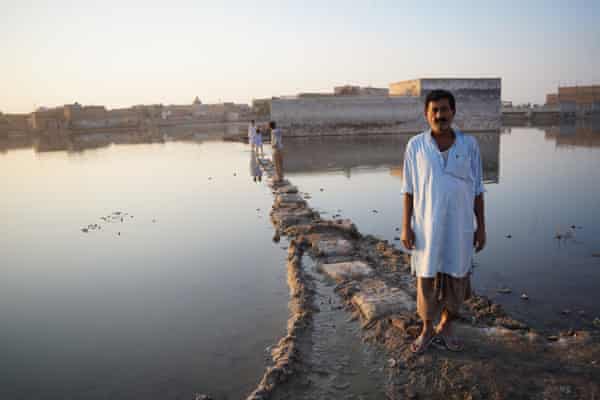 Mohammed Siddique, followed by some of his seven children, makes the perilous journey to his home. He has ‘begged’ for help in draining the contaminated water. Photograph: Shah Meer Baloch
Mohammed Siddique, followed by some of his seven children, makes the perilous journey to his home. He has ‘begged’ for help in draining the contaminated water. Photograph: Shah Meer Baloch
Mushtaq Ahmed, a shopkeeper, says poverty is rising. He has seen a 75% drop in customers at his shop. “People don’t have money. Most of the area is dependent on farming, and people have lost their fields and agricultural crops so they can’t afford to make ends meet.”
Banks and countries pledge over $9bn to rebuild Pakistan after catastrophic floods
There has also been a rise in crime. In January, dozens of people blocked the Indus highway between the cities of Dadu and Sukkur after armed robbers left a man dead. Protesters, who feel they have been left at the mercy of criminals, chanted slogans against the police and Sindh government.
“Since the floods we have seen a rise in crime. Thieves break into homes in villages and steal buffalo and livestock at gunpoint, even during the day,” says Allah Baksh, who joined the protest on the highway after his own home was broken into by robbers.
“Not a single day passes without reports of robberies from flood-affected villages and districts. The government has abandoned us and left us at the mercy of thieves and robbers. What can we do except to close the roads, protest and cry for justice?”
The Sindh government did not respond to requests for comment.
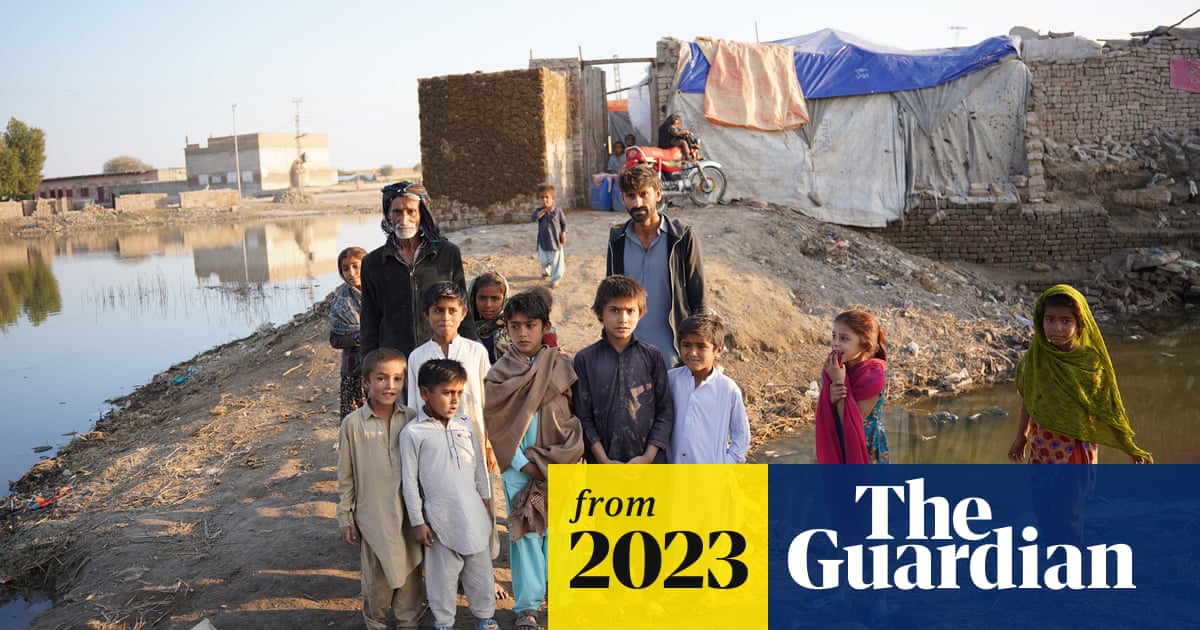
 www.theguardian.com
www.theguardian.com
This has been Ali’s routine since catastrophic floods hit Pakistan last year. “We lost everything,” says the father of 10. “We can’t go back now as our homes are still flooded and villages are inundated. Officials write down our names but they never come back with any help.
“Some families in other villages who could afford it had the water drained from their homes. They have gone back. We can’t afford it.”
Pakistan experienced its worst-ever flooding last year when three months of heavy downpours submerged about a tenth of the country. The UN called it a climate catastrophe. At least 33 million people were affected, the government said. More than 1,700 people died.
In most areas, the water has receded leaving much damage behind. But in the worst-affected areas – Sindh, where Dadu is located, and Balochistan provinces – stagnant flood water remains across vast swathes of land. At least 1.5m hectares (4m acres) of agricultural land were destroyed, leaving 15 million people short of food and estimated financial losses of between $30bn and $35bn (£25bn and £30bn). International banks and donors have pledged more than $9bn to help rebuild the country.

When Noorang Chandio was flooded in August, Ali joined other families taking refuge on the 50km-long Superio embankment in Dadu. For weeks, about 2,000 people perched there in makeshift shelters on the raised strip of land, which was then only accessible by boat.
When we see rain, we pray to God it should stop. We are tired of this life
Nearby roads have now re-emerged but murky green, pungent water remains, covering acres of the cotton fields. Most surviviors, including Ali’s family, now live in tents in a camp set up by the Sindh authorities.
But life is not easy. “It rained yesterday, and the water was flowing into our camps. We were shivering from the cold all night. When we see rain, we pray to God it should stop. We are tired of this life,” says Badal Chandio, whose tent is next to Ali’s.

Both men now sell buffalo dung to make ends meet and say the only financial support they received was a one-off cash payment of 7,000 rupees (£21) from the federal government’s Benazir Income Support Programme.
For the past month, Ali and Chandio say there has been no food distribution from any of the relief workers or NGOs. “We can’t leave our women behind in camps and go for work in other big cities, such as Karachi. We are worried for their safety in the camps,” says Chandio.
Hawwa (she goes by only one name) says it is a humiliating life. “There is no food or help. We have been given no blankets. We’re having a harsh winter, and have been living in camps without any facilities. We are poor. We can’t afford to rent another home, otherwise we could have done it to leave this humiliating life.”
Hawwa received the 7,000 rupees payment but that has not been nearly enough to cover her son’s healthcare costs. Last month, he was admitted to hospital with typhoid. “Medicines need money and no one is helping here. We ask God to come and help us.”
For many, going back to dilapidated homes surrounded by stagnant water has been preferable to living by the side of a road or in the camp. Others have put up tents in the grounds of what were once their homes.
Ghulam Rasool, a labourer in his 70s, returned to his village from the camp in Dadu in December. He found his house still surrounded by flood water. Metal support posts from the roof had been stolen. He used cattle dung and plastic that was floating in the water to patch up the roof.

“The floods have affected everyone but the impact is on the poor and labourers more than anyone,” says Rasool. “They don’t have anyone in the government. They don’t have any voice here. Rich and powerful people are getting money and all the help.”
The government has abandoned us … our politicians just remember us during the election
Rasool says he has heard many stories of corruption in the province. In September, hundreds of tents and other rations intended for flood victims were discovered by police in a warehouse in Qambar Shahdadkot district, which borders Dadu. Some local officials were arrested but no one has been charged.
“The international community should get involved in rehabilitation and construction work so that we, the poor, benefit as well,” says Rasool.
One of Rasool’s neighbours, Mohammed Siddique, a father of seven, agrees. Wading barefoot through water towards his home, he says: “It was impossible to live in tents. I came back to my home, but I have to cross water to get to it. I have begged the district administration to clear my path to home but no one is helping here. The government has abandoned us … our politicians just remember us during the election.”

Mushtaq Ahmed, a shopkeeper, says poverty is rising. He has seen a 75% drop in customers at his shop. “People don’t have money. Most of the area is dependent on farming, and people have lost their fields and agricultural crops so they can’t afford to make ends meet.”
Banks and countries pledge over $9bn to rebuild Pakistan after catastrophic floods
There has also been a rise in crime. In January, dozens of people blocked the Indus highway between the cities of Dadu and Sukkur after armed robbers left a man dead. Protesters, who feel they have been left at the mercy of criminals, chanted slogans against the police and Sindh government.
“Since the floods we have seen a rise in crime. Thieves break into homes in villages and steal buffalo and livestock at gunpoint, even during the day,” says Allah Baksh, who joined the protest on the highway after his own home was broken into by robbers.
“Not a single day passes without reports of robberies from flood-affected villages and districts. The government has abandoned us and left us at the mercy of thieves and robbers. What can we do except to close the roads, protest and cry for justice?”
The Sindh government did not respond to requests for comment.

‘God, come help us’: Pakistan families still hungry and homeless six months after floods
Forced to endure a ‘humiliating’ life in tent cities, waiting for stagnant waters to recede, villagers say they have been abandoned




